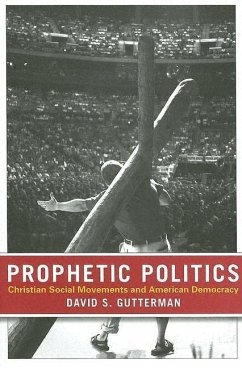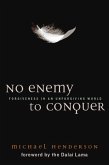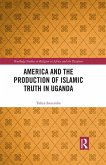"In an era of military conflict and economic hardship, religious and political leaders adamantly speak in the language of crisis. Whether one attributes this public religious fervor to a response to the attacks of September 11, 2001, millennial hopes and fears, a sense of moral decay (generally based on either growing economic inequality or the 'breakdown of the American family'), or a sign of the normal progression of the stages of history, the discourse of religious revival is increasingly prominent. And, as is amply evident in the United States and throughout the world, devout declarations of religious belief in the public sphere can bring intractable passions to politics."-from Chapter 1
What are the relationships among religion, politics, and narratives? What makes prophetic political narratives congenial or hostile to democratic political life? David S. Gutterman explores the prophetic politics of four twentieth- and twenty-first-century American Christian social movements: the Reverend Billy Sunday and his vision of "muscular Christianity"; Dr. Martin Luther King, Jr., and the Civil Rights movement; the conservative Christian male organization Promise Keepers; and the progressive antipoverty organization Call to Renewal.
Gutterman develops a theory based on the work of Hannah Arendt and others and employs this framework to analyze expressions of the prophetic impulse in the political narrative of the United States. In the process, he examines timely issues about the tense and intricate relationship between religion and politics. Even prior to George W. Bush's faith-based initiative, debates about abortion, family values, welfare reform, and environmental degradation were informed by religious language and ideas. In an interdisciplinary and accessible manner, Gutterman translates the narratives employed by American Christian social movements to define both the crises in the land and the path to resolving these crises. The book also explores the engagement of these prophetic social movements in contentious political issues concerned with sex, gender, sexuality, race, and class, as well as broader questions of American identity.
What are the relationships among religion, politics, and narratives? What makes prophetic political narratives congenial or hostile to democratic political life? David S. Gutterman explores the prophetic politics of four twentieth- and twenty-first-century American Christian social movements: the Reverend Billy Sunday and his vision of "muscular Christianity"; Dr. Martin Luther King, Jr., and the Civil Rights movement; the conservative Christian male organization Promise Keepers; and the progressive antipoverty organization Call to Renewal.
Gutterman develops a theory based on the work of Hannah Arendt and others and employs this framework to analyze expressions of the prophetic impulse in the political narrative of the United States. In the process, he examines timely issues about the tense and intricate relationship between religion and politics. Even prior to George W. Bush's faith-based initiative, debates about abortion, family values, welfare reform, and environmental degradation were informed by religious language and ideas. In an interdisciplinary and accessible manner, Gutterman translates the narratives employed by American Christian social movements to define both the crises in the land and the path to resolving these crises. The book also explores the engagement of these prophetic social movements in contentious political issues concerned with sex, gender, sexuality, race, and class, as well as broader questions of American identity.
Dieser Download kann aus rechtlichen Gründen nur mit Rechnungsadresse in A, D ausgeliefert werden.









